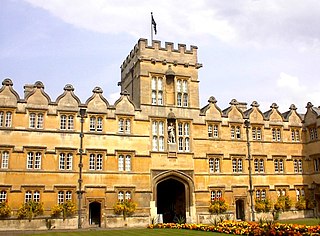Related Research Articles

University College, formally The Master and Fellows of the College of the Great Hall of the University commonly called University College in the University of Oxford and colloquially referred to as "Univ", is a constituent college of the University of Oxford in England. It has a claim to being the oldest college of the university, having been founded in 1249 by William of Durham.
Foston may refer to:

George Rowley was Dean and Master of University College, Oxford and Vice-Chancellor of Oxford University.
Sir Kenneth Clinton Wheare, was an Australian academic, who spent most of his career at Oxford University in England. He was an expert on the constitutions of the British Commonwealth. He advised constitutional assemblies in former British colonies.

The Very Revd. John Herbert Severn Wild (1904–1992) was Dean of Durham and Master of University College, University of Oxford.
John Browne (1687–1764) was an Oxford academic and administrator. He was Fellow and Master of University College, Oxford, and also served as Vice-Chancellor of Oxford University.

Revd Dr Thomas Cockman, Doctor of Divinity (1675–1745) was an Oxford academic and administrator. He was Master of University College, Oxford.
Thomas Bennet, also spelt Benet, was an English academic at the University of Oxford.
Thomas Caius was an Oxford academic and administrator. He was Fellow and Master of University College, Oxford.
James Dugdale was an Oxford academic and administrator. He was Fellow and Master of University College, Oxford.
Leonard Hutchinson was a Fellow and Master of University College, Oxford, England.
John Martyn, also known as John Marten, was a Master of University College, Oxford, England.
John Crayford was a Master of both Clare College, Cambridge, and University College, Oxford, England. Martyn was unusual in being a Master of colleges at both the universities of Oxford and Cambridge. He was the only Master of University College to also have been a Master at a Cambridge college.
Ralph Hamsterley was a Master of University College, Oxford, England.
Richard Salveyn was a Master of University College, Oxford, England.
Anthony Salveyn was a Master of University College, Oxford, England.
Richard Witton was a Master of University College, Oxford, England.
John Castell was a Master of University College, Oxford, and later a Chancellor of the University of Oxford. Castell was a Fellow of University College. He became Master of the College circa 1408. He also held preferment in the Diocese of York with his mastership. In 1411, a sentence of excommunication was issued by the Archbishop of Canterbury, Thomas Arundel, against Castell, Fellows at the College — Robert Burton, John Hamerton, and Adam Redyford — and the College as a whole, due to Lollardy leanings. An appeal to the Pope against the excommunication was made by the bursar of the College, John Ryvell. Castell survived the controversy and continued as Master until 1420.
William Kexby MA was a late 14th-century Master of University College, Oxford, England.
References
- 1 2 Darwall-Smith, Robin (2008). A History of University College, Oxford. Oxford University Press. pp. 45, 529. ISBN 978-0-19-928429-0.
- ↑ Carr, William (1902). "Chapter III, The Fourteenth Century: The Early Home of the College, First Benefactors, The Great Lawsuit". University College. University of Oxford: College Histories. Vol. 18. Archived from the original on 30 October 2007.